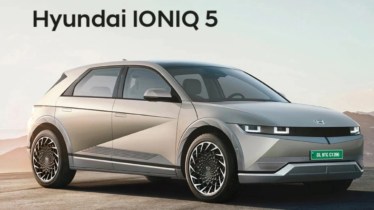On Tuesday, Hyundai Motor India (HMI), the country’s second largest carmaker, will unwrap the Ioniq 5, which will not only complement its presence in the electric vehicle space but will become yet another example of the Korean brand’s steady journey towards premiumisation.
Expected to be priced significantly higher than the Hyundai Kona (Rs 24 lakh), it’s only electric offering in India till now, the Ioniq 5 will power Hyundai’s efforts to go after high-margin, premium products and shed its yesteryear’s image of a budget car maker that competed on price with the market leader Maruti Suzuki.
Also Read: Hyundai-Kia’s creative talent platform ZERO1NE to showcase innovative startups at CES 2023
The maker of sports utility vehicles like Grand i10 Nios and Venue, has improved its net profit per car sold to more than 60% in just the last five years. As per financial data disclosed by Hyundai Motor India to authorities, the company’s profit per car in FY22 stood at Rs 46,859 while for CY17 it was Rs 29,000.
The company dropped low-margin, budget models such as Eon, Santro, i10 and Xcent from its line-up to make way for profit-driving models like Creta and i20 among other top-selling products including Grand i10 Nios.
The growth in profits for Hyundai has come despite a drop in total volumes of the company. In FY22, HMI clocked total sales (domestic + exports) of 610,760 while in CY17 it stood at 676,825, indicating a higher average selling price per car.
FY22 saw Hyundai post its best-ever profit in India at Rs 2,862 crore, a growth of 55% compared to Rs 1,847 crore posted by it in FY21. The growth in profits has come on the back of a growth of just 6% in total volumes last year to 610,760 units. In FY21, the average realisation per car for Hyundai stood at Rs 7 lakh while for Maruti Suzuki it was Rs 4.6 lakh for the same year.
Also Read: CES 2023: Hyundai Motor Group kickstarts pilot last-mile delivery program
According to Hyundai, the contribution from models ranging over Rs 10 lakh which stood at 20% in 2018, grew to 41% in 2022. Similarly, for models ranging over Rs 15 lakh, the contribution to its portfolio which stood at 3% in 2018, grew to 16% in 2022.
“These pointers clearly indicate a growing preference for higher spec models in our range and a preference for feature rich packages. In fact, even for novelty features such as sunroof, sales contribution for models equipped with sunroof has increased from 18% in 2019 to 37% in 2022,” said a Hyundai India spokesperson.
The Korean car brand claims to have successfully caught the attention of the young buyers. For instance, people under the age of 29 years contributed to 30% sales in 2020 for the mid-size sedan Verna; this has increased to 40% in 2022. Similarly, the Venue N Line, a premium variant than the regular Venue, has 30% of customers under the age of 29 years. With the Ioniq positioned as a lifestyle SUV by Hyundai, the idea is not to capture the EV car market priced below that but above the Rs 10 lakh category, say market watchers. The Ioniq is built on the same platform used by the Kia EV6 which was launched by the company some months ago. The Rs 60 lakh EV6 is a fully imported vehicle unlike the Ioniq which will be built in India and therefore priced cheaper.
